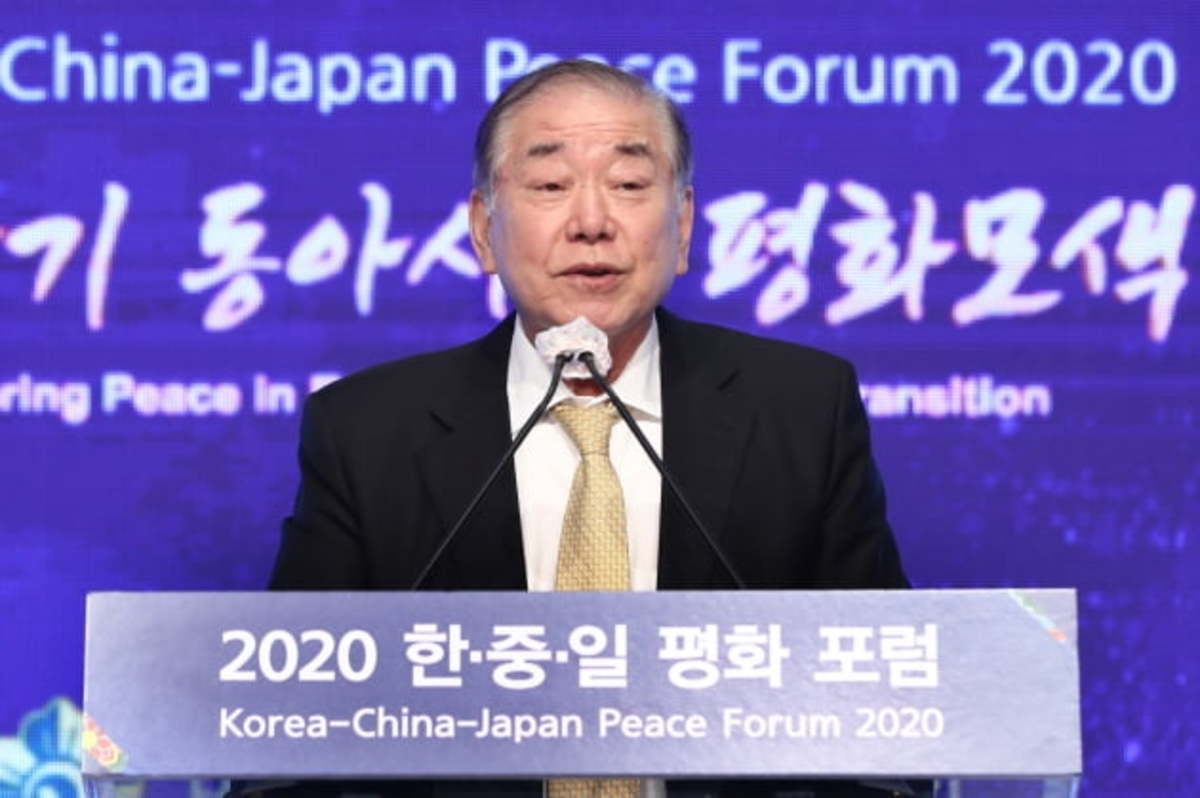 |
(Yonhap) |
WASHINGTON -- South Korea's participation in a NATO-like multilateral military alliance in the Indo-Pacific may destabilize, rather than promote security, in the region as China will treat Seoul as an enemy, a special adviser to South Korean President Moon Jae-in said Tuesday.
The adviser, Moon Chung-in, also insisted the US' drive to form a regional coalition against China may prompt a counter-reaction from Beijing to form an alliance with Russia and North Korea.
"The United States is our number one ally while China is our strategic cooperative partner. Therefore, our priority goes to the United States, but in doing that we have some concerns," the South Korean presidential adviser said in a webinar, co-hosted by the Atlantic Council in Washington and the East Asia Foundation in Seoul.
Washington is currently involved in a four-way dialogue, known as the Quad, that includes Australia, India and Japan, and is seeking to build upon the regional dialogue to form a multilateral structure that it says will counter aggression from the Chinese communist party in all domains.
The US is calling on its other regional partners, including South Korea, to join the forum, though Seoul says the US has yet to extend a formal invitation.
The South Korean adviser insisted such an invitation, if made, would create an "existential dilemma" for South Korea.
"If the United States forces us to join some kind of a military alliance against China, then I see that will pose a very existential dilemma to us," Moon said at the virtual seminar.
"Suppose we joined a military exercise along the (inaudible) strait, as well as (in the) South China Sea, then China will treat us as an enemy," he insisted.
The professor emeritus at Seoul's Yonsei University also argued a coalition against China may encourage Beijing to resume its military assistance to North Korea under a tripartite alliance that would also involve Russia.
"China will be strengthening the northern tripartite alliance system involving China, Russia and North Korea. China has not provided North Korea with any military assistance and weapons and logistics support since 1958. But if that happens then, China will resume its assistance of military weapons, logistics support for North Korea, including oil," said Moon.
"Then, the conventional threat from North Korea, in addition to nuclear set, will be further strengthened," he added.
Instead, to promote peace and security on the Korean Peninsula, the special adviser said the countries must seek to declare a formal end to the Korean War as the start of North Korea's denuclearization process.
"Dr. Park Jin argues that the end-of-war declaration should be an exit rather than entrance," Moon said, referring to earlier remarks made at Tuesday's webinar by Rep. Park from South Korea's main opposition, the People Power Party.
"But I would argue in (a) different way. The end-of-war declaration should be an entrance that can facilitate the denuclearization of North Korea. as well as the overall peace process on the Korean Peninsula," the adviser added.
His remarks highlight a recent controversy over Seoul's intentions.
In a Sept. 22 speech at the UN General Assembly, President Moon called for international efforts to formally end the 1950-53 Korean War, saying the end-of-war declaration will open the door to North Korea's "complete denuclearization."
His call, however, prompted speculation that Seoul may be moving to make a concession to the communist North, despite Pyongyang's refusal to denuclearize, let alone return to the negotiating table.
Seoul's top national security adviser, Suh Hoon, earlier dismissed such concerns, saying the end-of-war declaration cannot be dealt with separately from North Korea's denuclearization process, and that only remaining issue is when such a declaration should or could be made.
Moon also dismissed concerns that a declaration of the end of the Korean War may lead to a drawdown or change in the status of US Forces Korea.
"President Moon Jae-in made it very clear. The status of American forces in South Korea is a matter of alliance between Washington and Seoul. There is no room for North Korea to intervene in that issue," said the adviser.
Should North Korea insist on changes to the status of USFK as a precondition to the end-of-war declaration, "then the end-of-war declaration may not be adopted," he added. (Yonhap)




![[Herald Interview] 'Trump will use tariffs as first line of defense for American manufacturing'](http://res.heraldm.com/phpwas/restmb_idxmake.php?idx=644&simg=/content/image/2024/11/26/20241126050017_0.jpg)

![[Health and care] Getting cancer young: Why cancer isn’t just an older person’s battle](http://res.heraldm.com/phpwas/restmb_idxmake.php?idx=644&simg=/content/image/2024/11/26/20241126050043_0.jpg)

